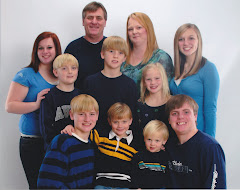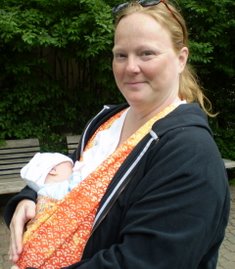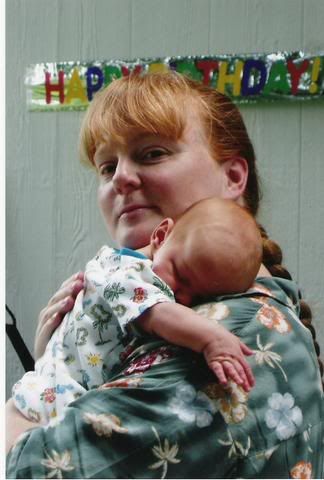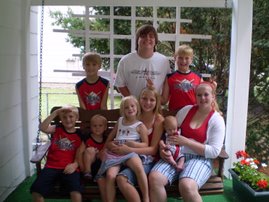Interesting article
Below is a copy of an article that came across one of the list I am on, I really found it interesting. Forgive the formatting, it didn't copy and paste very well! If you get a chance, check out their website at www.elijahcompany.com there is even a newsletter you can sign up to recieve!
As a mom who believes in child led learning, the article really hit home with me. Having had my children home for so many years now, I am used to the blank stares and wide opened mouth expressions I get when I answer someone "we don't use a curriculum" or "we don't do school". Yes, some of my children chose to take classes, some ask for a textbook on this subject or that, some work through a workbook of their choice, but what we do most is just live our lives. When I look at my kids, the bright, beautiful, energetic creatures that I share my life with, I doubt that a lack of school is harming them in any way!
"A MISUNDERSTOOD MOVEMENT?"
I don't know how keeping our children home during the day came to beknown as "Home Schooling," but I do have a theory: If I asked most adults, "What is the appropriate activity for every child, age sixto age eighteen, during the days Monday through Friday?" Most adultswould say, "These are the years when a child is being schooled, ofcourse." That is why we have such phrases in our vocabulary asthe "school age child." So, if a child is to be "schooled" duringthese formative years, the only real question is, "Where will he be schooled?" Today, the answer is, "He will either be public schooled,private schooled, Christian schooled, or home schooled."Assuming, then, that every child is to "be schooled" during the day,if he is home during the day, he will be home schooled during theday. Hence the origin of the label "homeschooling."Is "schooling" really supposed to be a child's primary dailyactivity? It wasn't until the advent of the modern public schoolmovement. Schooling a child was never meant to be the "constant"with the variable being where the child spends his or her day. Ithas always been just the other way around.What is so problematic with the term "Home Schooling" is what it hasdone to parents whose children are spending their days at home.Giving an activity a label means something to those involved in theactivity. If we are comfortable with certain words in the label andnot so comfortable with other words, those words with which we feelleast secure will take on greater significance. Insecurity is a niceword for fear. Whatever we fear becomes a driver in our lives as weattempt to overcome our fear and feel secure again.When we sent our children to school, we felt a sense of securitythat trained professionals were educating them. We didn't pretendthat we could do a job which others had spent years being trained todo. We might feel that we could raise our children in some areas,but not to provide for their education.Then, one day, we became homeschoolers. Insecure homeschooler; buthomeschoolers nevertheless. However, since what we were doing waslabeled "homeschooling," we, in our insecurity, actually became home-SCHOOLERS rather than HOME-schoolers. The importance of our childrenbecoming educated (isn't that what children do during the day?) tookon greater prominence than the importance of them being home. Thisis understandable when we realize that there is no cultural memoryof what having our children home really means to the family or tosociety.What did I mean when I told my son, "And, your kids won't behomeschooled"? During Seth's years at home, his academic educationwas never the main priority. In our home, we did have a rigidpriority structure, but those priorities were first relationships;second, practical skills; and, finally, academics. Seth grew up witha strong academic upbringing, but academics were never our priority.Seth is a skilled, very competent individual of the highestcharacter. He is also one of the happiest young men I have everknown. As I look back at Seth's time at home, I have come to realizethat he was never "homeschooled." He simply grew up in a mostremarkable place—his homeWhen our children were young we would take them with us to thestore. Other kids were in school. The check-out lady wouldinevitably ask, "You boys aren't in school today?" Since the boysknew we were homeschoolers, they would respond, "No, ma'am, we'rehomeschooled."STARTING OVERIf I could do it all over again, I would not callourselves "homeschoolers." I have actually come to dislike the termbecause I think it creates significant problems. If I were startingover again, when the lady at the store says, "You boys aren't inschool today?" I would teach the boys to say, simply, "No ma'am,"and let it go at that.In just the past year I have noticed a growing distinction betweenfamilies who are homeschooling and those whose children are home,but not being homeSCHOOLED. Are the "not-being-homeschooled"children receiving a quality upbringing, including a qualityeducation? Today enough research exists that I can honestly say anunequivocal "yes". I would even go so far as to say that the not-being-homeschooled child is receiving an education which is superiorto the child being homeschooled. [For a fuller discussion on this,see our article, "Identity-Directed Homeschooling"].The availability of what has come to be known as "prepackagedcurricula" is helping manifest a separation of the two types offamilies who were once grouped together under the oneterm: "homeschoolers." Many parents purchase prepackaged curriculabecause they don't understand what God originally intended when Hebegan this movement over twenty years ago.What do you think your children should be doing all day now thatthey are home? Probably the most obvious way to determine what youreally believe is to ask yourself, "Is my child the constant or ismy child's education the constant?" Look at the materials you use tobring learning into your child's life. Do you use graded,prepackaged, curricula? Is your child in a grade as he would be ifhe were in an institutional setting? Do you follow theinstitutionalized Scope & Sequence educational model? Or, have youstepped completely out of the lock-step, institutional way ofraising your child?This article is not intended to discourage, but to give hope. Inmost parents' hearts is the desire to reprioritize their livesaround what is truly important to them: having a relationship withtheir children. To bring your children home can be an immenselifestyle change. For some, making this change has to be done instages. If you have brought your children home it may have beennecessary (for a season) to place before them the everpopular "curriculum-in-a-box." Hopefully, that season will be short.Our children never went to school, were never in a grade, and wenever used a prepackaged curriculum. Nevertheless, it took us awhile to learn all that I am sharing with you here. Be encouraged.You are allowed to do what your heart tells you is right.IF WE AREN'T HOMESCHOOLING, THEN WHAT ARE WE DOING?Right now, nearly two million children are spending their days athome rather than "at school," thus putting an end to a 150year "detour" which began in the 1850's and which seriously harmedfamily life and Kingdom community as God initially intended them tobe lived. As families leave this detour and turn onto the road whose name is "Life As It Was Intended To Be," we will see vistas we have only read about in books. Let me offer some suggestions.
1 Don't send your children to school. Any school. Bring them home.Raise them to be the individuals God has created them to become.
2 Don't bring the school, any school (along with its "efficient",but arbitrary, grade levels, scope & sequence, and boxed curriculum)into your home. Allow your children to learn through life and therelationships around them.
3 Learn how to awaken curiosity in your children. (This is thesubject of a future EJournal.)
4 The only thing that should be prepackaged is your child. By thisI mean your child was born with all the talents, giftings, andcallings put into him or her since the foundation of the world. Findout what these are and let your child become truly good at what youfind. [For a fuller discussion of this, order the Davis'tape, "Identity Directed Homeschooling"]
5 Dad's heart must turn toward his children and the hearts of thechildren must turn toward Dad. Ultimately, this may bring Dad out ofthe corporate workforce to come home. This final step may takeanother generation to be fulfilled. But, for it to be fulfilled,Dads must at least begin moving in that direction (ie. Giving hischildren the option of becoming entrepreneurs).
6 In your own home, let "homeschooling" die. In other words, don't homeschool your children.God has asked us to raise a generation prepared for the future by becoming exactly what He intended each person to become. This willbe different for each and every child. Your home is the place wherethe acorn can become the oak tree. Or, the seed can become the mapletree. Or, the other seed can become the pine tree. Plant your children squarely in their own home and allow the individual God created to grow.
Chris Davis is the founder of the Elijah Company and a father of 4children."
--------------------------------------------------------------------------------
Any article appearing on this website may be copied or forwarded electronically provided that proper credit is given and that thearticle is not substantively modified. No article may appear inwhole or in part in a publication sold for profit or as part of anycommercial endeavor without the written consent of The ElijahCompany.© Copyright 2003. Elijah Company 1.888.235.4524 www.elijahcompany.com
Thursday, September 15, 2005
Subscribe to:
Post Comments (Atom)









1 comment:
I hit the highlights of the article as I am very tired right now, but I couldn't agree more. I still have "issues" with a lack of curriculum being a former public school teacher, but I am getting over them. Some. Thanks for the article.
Post a Comment